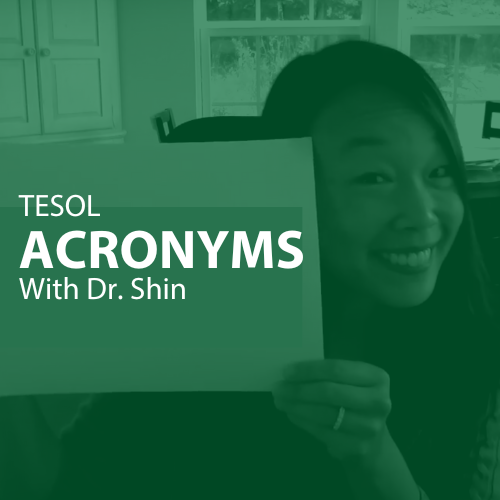ELL, EL, LEP, ESOL, TESOL, ESL, EFL, EAL, EIL. . . keeping up with the latest terms in education can feel like learning a new language! Dr. Joan Shin, Professor of Education at Mason and Director of Mason’s Global Online Teacher Education Center (GOTEC), has published a video to help students understand some of these commonly used acronyms. Watch this video by Dr. Shin or continue reading to learn more about what each of these terms really means and how to distinguish between them!
What does ELL stand for?
ELL – English Language Learner is the term that I hear people using the most often these days – especially my students, who are all preparing to become ESOL teachers. This is a good way to describe our students who are learning English as a second or additional language. However, it isn’t the most current way to refer to them!
What is the most current way to refer to students who are learning English as a second or additional language?
EL – English Learner is the most updated term to use! This is what is being used now by the US Department of Education and you will start to see this more often. When we are talking or writing about our students who are learning English as a second or additional language, we want to try to use this term now.
Are there any other terms that refer to students who are learning English as a second or additional language?
LEP – Limited English Proficient is the old way to refer to our students who are learning English in our schools. This term is not currently used, as we don’t want to describe our students as “limited.” I only mention it because you may still see this on school documents or old articles. Always try to use EL – English Learner to refer to our students!
What are the terms that refer to teaching EL students?
ESOL – English to Speakers of Other Languages is a popular term because it doesn’t exclude students who are multilingual – maybe they’re learning English as a third or fourth language. This is a common term in schools, and is also used in our program!
Are there any other terms that refer to teaching EL students?
TESOL – Teaching English to Speakers of Other Languages is a term used to describe our field of study – you might be studying how to teach ESOL. You might also see TESOL to refer to a teacher association, in which case it stands for Teachers of English to Speakers of Other Languages and TESOL International Association is a great place to learn more about how to teach your English Learners.
What is the difference between ESL and EFL?
ESL – English as a Second Language is used in the context where English is commonly spoken, like here in the United States, so we usually think about students studying it as a second language.
EFL – English as a Foreign Language is when English is being taught in a context where English is not commonly spoken. For example, in South Korea or Brazil oftentimes we describe students as learning English as a Foreign Language.
When you see these two terms in articles or in information about programs, now you know the difference – it depends on where you are learning English!
Are there any other terms I should know?
EAL – English as an Additional Language is often used nowadays instead of ESL – English as a Second Language. As previously mentioned, we have many students who are studying English, but it’s not their second language. Students who come from countries where people are multilingual might prefer to be described as learning English as an Additional Language.
EIL – English as an International Language might be used in place of EFL – English as a Foreign Language. This distinction emphasizes the status of English as a global language. People are learning English all over the world in order to communicate as a kind of as a “lingua franca.” It is this recognition that it isn’t necessarily a foreign language for people around the world – they’re learning this as an international language.

